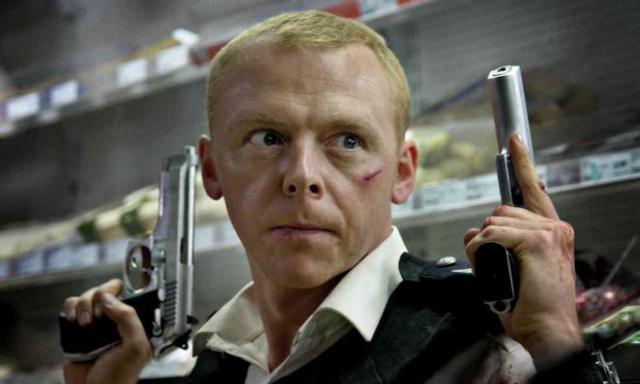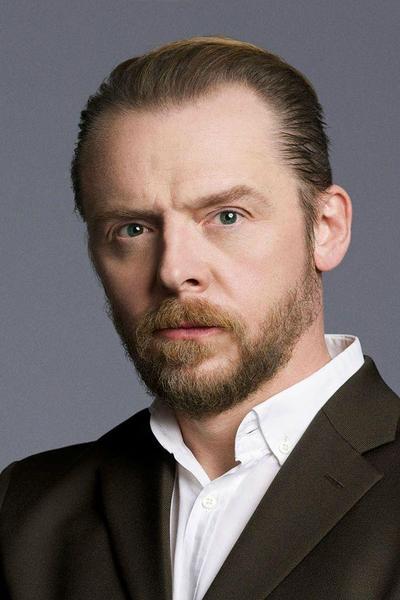In Conversation With... is our interview series where we talk to someone of the most well-known and respected actors and directors about their career, filmography, influences, what they make of the industry nowadays and everything in between.
Simon Pegg's career has been an interesting one to chart, to say the least. Beginning with surrealist comedy shows like Asylum, Pegg then starred in Graham Linehan and Arthur Matthews' short-lived follow-up to Father Ted, Hippies, before working with his two most frequent collaborators - Nick Frost and Edgar Wright.
From Spaced, it was on to Shaun of the Dead and Hot Fuzz before Pegg graduated to Mission: Impossible III and became the household name he is today. With Star Trek Beyond, Pegg takes on the dual role of both actor and writer.
We began by asking Pegg about the unique challenges of balancing the two and his own history as a hardcore Trekkie...
Being a fan of Star Trek and having starred in the film, is there not a benefit in approaching Star Trek Beyond with a sense of detachment from it?
I don't know, I feel like it was the right thing to do. I think getting two people (Pegg wrote the screenplay with Doug Jung) who were plugged into that universe, who understand it and can hit the ground running was important because of the timeframe. We had six months to get the screenplay to a point where we could start shooting - which was no time at all. If you had anyone who was unfamiliar or was so detached that they didn't understand what they were doing, it could have been difficult in terms of getting it ready in time.
So, it was a decision of Paramount's to bring in someone from the organisation to participate in the writing. It was something I immediately said yes to, I knew it was going to be difficult and it felt like it was insurmountable at times. But, y'know, it really was a pleasure as a writer to be given a pre-existing amount of situations and planets and so on, to be able to create a story from that. It was a less daunting experience than a blank page, definitely.
From what I've seen of the film so far, it does look like it's taking a leaf out of the original series - insofar as placing the crew of the Enterprise on a hostile planet for the duration of the episode / film.
Yeah, we felt like we wanted to - at least cinematically - embrace the structure of the original series, the idea of the unknown planet. We wanted to get as far away as possible from Earth and not rely on any pre-existing knowledge of the show. We wanted it to be inclusive; if there was fifty years of knowledge, there's lots and lots for you. If you come to it with none, you're still going to understand the meat of the story. We watched a lot of episodes, Doug came to stay with me here in the UK.
If we did a twelve-hour shift and got to our deadline for the day, we'd go downstairs and watch a couple of episodes to take notes and grab a few character names as Easter eggs for the faithful. We actually had a list of Red Shirt names! (laughs) It's an interesting process. You've got to be simulataneously familiar and new without drfifting too much into both.
When Gene Rodenberry was doing The Next Generation, he had Horatio Hornblower as the inspiration for Patrick Stewart. Outside of the original series, was there anything you drew upon when writing?
No, not really. When Gene Rodenberry was starting The Next Generation, he wanted it to have a different dynamic to the original series, which as we know was Wagon Train to the stars. So by the time we came to write Beyond, there was already fifty years of Star Trek as a reality - so we really didn't have to bring anything else. There's a fully-realised universe there and we could start arranging in our own way. It was the one thing that made the process easier and, in a way, we felt like we should draw on the fifty years and not make it feel like anything other than Star Trek because, well, it wouldn't be Star Trek! (laughs)
Have you spoken to Bryan Fuller, incidentally? (Bryan Fuller is the showrunner on the upcoming Star Trek TV series)
No, I haven't. Zac (Zachary Quinto, who plays Spock) knows Bryan really well because they worked on Hannibal together. I'm really excited for it. I absolutely think should have a home on television. That's where it began. The movies were always a companion piece to the TV show. They were almost like a celebratory events of the TV show that would come along every few years. I'm excited to see what Bryan does, it's very cool to have it in his hands. It's going to be extraordinary.
Looking at the two, the rebooted film series has more of a broad appeal whereas the TV series looks to be a bit more... I don't want to say cerebral, but more in-depth. Can the two co-exist?
Television gives you the opportunity to do that, to be more in-depth. The thing with the films is they have to be events. They have to cram a lot in a short space of time and in order to draw the audiences out, it's almost like a condensed, concentrated Star Trek pill. With a TV show, you can take time with your arcs, you can be cerebral, you can just... luxuriate a little more. That's the joy that television brings us. What's interesting now is that television is a far more cinematic prospect than it's ever been. The more cinema that becomes like TV, in fact that you get episodes of things, like The Avengers or Star Trek.
Now, television can be visually much more stunning, so it's gonna be great to get back to that very cerebral Star Trek for those who people who enjoy the slightly, not slower paced... having more time to tackle stories, having things happen over a longer period of time. With the movies, we have to get a certain amount of stuff in.. in two hours. It has to be a certain thing. They always have co-existed, from the Motion Picture all the way up to Into Darkness. And, y'know, I think TV audiences are very smart and very capable of enjoying something like that properly.
Speaking of television, how much money would Netflix or whoever have to throw at you to do another season of Spaced?
Oh, you'd have to ask Edgar that one. Edgar's a film director now and it'd be very hard to get him back to TV. But, y'know, you never know. He might go back to television, I'm not sure. But, without Edgar, we wouldn't be able to do Spaced because it was very much the product of me, Edgar and Jessica. We'd all have to be in the right place to do it, y'know? It's not a question of money, it's whether it's right or not and whether we have anything to say about that anymore. That series was written at a very specific time in our lives when we were living lives very similar to those characters. I don't think we could write Spaced, we're not in touch reality anymore! (laughs) It'd be weird. We'd have to write a sitcom about forty-something film professionals to give it any kind of honesty.
OK, final question. We're talking about Star Trek, it's an idealised vision of the world and so on, federalist utopia and so on. Brexit. Any thoughts? Any opinions?
Only that it's a retrograde step. The older generation voted against the younger generation. I'm a little embarrassed by it because it feels like... we don't want to play. For all the complexities of the EU, it was a step in the right direction. That has to be the way we work forward. I feel like kinda sad by it, not just for the obvious reasons. As someone who works in the film industry, it's going to affect our profession negatively and... just for that reason, it's a shame. We've taken in our ball and everyone's going, "What's wrong with those guys?" Also, I hate seeing Nigel Farage in the European Parliament speaking for... me, because that motherf...! (laughs)
Star Trek Beyond is released in Irish cinemas on July 22



















































































